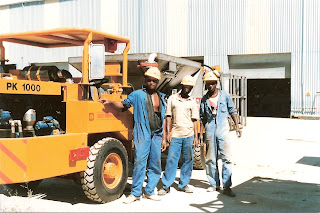 < 1988. Mark Esslemont, Staff Consultative Committee, Koffiefontein Rec Club.
< 1988. Mark Esslemont, Staff Consultative Committee, Koffiefontein Rec Club. I organized "staff" and "monthly-paid" consultative committee elections, and coordinated and minuted agenda meetings. German-GM chaired consultative committees, which aired grievances and criticism about De Beers living and work conditions, which I minuted. "Staff" were the highest paid white employees with few coloureds and less blacks. Eddie, Jonas and Moses were the only black "staff." At "staff" consultative committee meetings, white elected representatives discussed mutually beneficial issues with management. I circulated minutes to consultative committee members and other employees, usually engineers, who processed corrective action.
There were no blacks on the "monthly-paid" artisan consultative committee, legacy of apartheid job reservation. The committee had vigorous, outspoken coloured and Afrikaner elected representatives. Artisan "monthly-paid" workers were adequately paid, like me, with free company housing, on the Paterson C band. Coloured chairman, Doppelganger had worked at Koffiefontein for years, even during closure as skeleton-staff, and represented white and coloured artisans. Doppelganger complained about roadworks at Diamanthoogte. Other complaints included plumbing; parks; lake recreation facilities; veld encroachment; neighbours' tree branches; toilets; rec club renovation. A big issue was shower-room facilities, as white artisans wanted to keep shower-rooms racially separated. It was OK to mine and perhaps die underground together, but not OK to shit-shave-shower-shampoo together on the mine surface. German -GM said, "We're changing. We're no longer paternalistic!"
There was no consultative committee for black and coloured labourers, who worked mostly in metallurgy and underground mining, and belonged to NUM union, which replaced a black consultative committee. In De Beers-speak, labourer / operator blacks and coloureds were monthly-paid workers on low A and B Paterson bands. Gijima, elected full-time shop-steward, reported to Frikkie. When NUM called a legal strike, apropos De Beers-NUM recognition-agreement, IR personnel monitored strike-ballots late at night when black shift-workers emerged from underground at shifts -end. Monitoring ensured no intimidation occurred while workers signed, or didn't sign. Never mind dangers to IR officers, in a hostile work environment.

< 1988. Koffiefontein Mine's new Emulsion Explosive Vehicle with Operators & Shop-steward.
I gave a recognition-agreement seminar to black shop-stewards in the black hostel training-room. Moses and Jonas were interpreters. Several native languages were spoken, but Afrikaans was the lingua franca. Ballon welcomed the shop stewards in English. Shop-stewards rose from their desks and walked out. Ballon whirled past shop-stewards, back to the admin buildings. "Why've shop-stewards walked out?" I asked Gijima.
"Mhlongo's not weeth us," said Gijima, doffing his sunglasses.
"Due to Mhlongo's poor timekeeping his foreman kept him working underground," I said.
Frikkie dust-devilled in: sucking shop-stewards inside. "Mhlongo will stay working underground," said Frikkie. "I'll give him a lecture - later. Stop being obstructive and get on with the seminar hey?" I handed Jonas and Moses my English lecture notes, and they continued in Sotho, Tswana and Afrikaans, thus saving me from swart gevaar. A bat flew through the window. Shop-stewards jumped up, trying to catch the devil-wind bat by flinging jerseys, caps and pens. The bat escaped.
I'd arranged a meal in the black hostel dining-room. "Why mus' we eat in da hostel?" asked Gijima. "Why can' we eat in da white dorp hotel, where whites eat?"

< 1988. Volunteer Kitchenhands, Diamanthoogte Coloured Rec Club, Koffiefontein.
"Skip the meal?" I said. Shop-stewards sniggered and ate in the hostel. Their posturing was more puerile than Sotho kids I'd taught. (Years later, the same white hotel was razed). After the seminar I said to Gijima, "Thanks for dropping me." Gijima looked skaam. He'd been a training instructor before becoming a shop-steward. As job reservation laws were breaching, Gijima planned to get his blasting-certificate and become one of De Beers first black miners, a job reserved for whites for years.
Copyright Mark JS Esslemont.

No comments:
Post a Comment